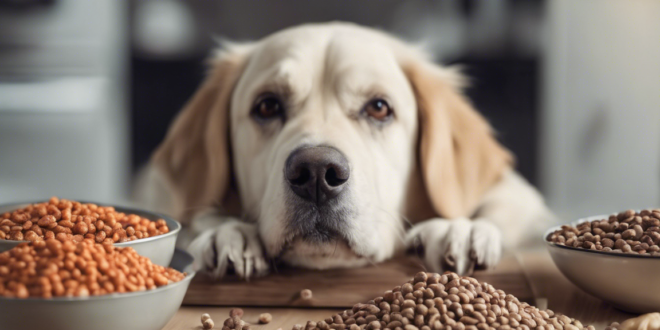Optimal Nutritional Composition for Weight Loss Dog Foods: A Comprehensive Guide
Managing canine obesity has become a critical challenge for pet owners and veterinary nutritionists. With over 50% of dogs in the United States classified as overweight or obese, understanding the precise nutritional requirements for effective weight loss is paramount. This comprehensive guide explores the ideal protein, fat, fiber, and carbohydrate contents that can help dogs achieve and maintain a healthy weight.
Understanding Canine Obesity and Nutritional Needs
Obesity in dogs is more than just an aesthetic concern. It’s a serious health condition that can lead to numerous medical complications, including diabetes, joint problems, cardiovascular diseases, and reduced life expectancy. The key to successful weight management lies in developing a carefully balanced diet that supports metabolic health while promoting gradual, sustainable weight loss.
Protein: The Foundation of Weight Loss Nutrition
Protein plays a crucial role in weight loss dog foods. Veterinary nutritionists recommend a protein content of 30-40% on a dry matter basis for weight loss diets. High-quality, lean protein sources help maintain muscle mass during calorie restriction and support metabolic function. Ideal protein sources include:
• Chicken
• Turkey
• Fish
• Lean beef
• Egg proteins
The protein composition should be highly digestible and provide essential amino acids that support lean muscle preservation during weight reduction.
Fat Content: Balancing Energy and Weight Loss
Fat content requires careful management in weight loss dog foods. Experts recommend reducing fat to approximately 10-15% on a dry matter basis. This approach serves multiple purposes:
• Reduces overall calorie intake
• Provides essential fatty acids
• Supports metabolic function
• Maintains palatability of the diet
The goal is to create a calorie-restricted diet that doesn’t compromise nutritional integrity or the dog’s overall health.
Fiber: The Secret Weapon in Weight Management
Dietary fiber is a critical component of weight loss dog foods. Recommended fiber content ranges from 3-5% on a dry matter basis. Fiber offers multiple benefits:
• Increases satiety
• Slows nutrient absorption
• Supports digestive health
• Helps regulate blood sugar
• Provides a feeling of fullness
Ideal fiber sources include:
• Beet pulp
• Chicory root
• Pumpkin
• Vegetables
• Whole grains
Carbohydrates: Strategic Energy Management
Carbohydrate content should be carefully controlled, typically ranging from 20-30% on a dry matter basis. Complex carbohydrates are preferred over simple sugars, providing sustained energy and supporting metabolic health. Recommended carbohydrate sources include:
• Sweet potatoes
• Brown rice
• Quinoa
• Barley
• Legumes
Calorie Considerations
Successful weight loss requires a calorie-restricted diet. Most weight loss dog foods should provide approximately 2.5-3 calories per gram, compared to 3.5-4 calories in standard maintenance diets. This reduction helps create a calorie deficit necessary for weight loss while maintaining nutritional completeness.
Additional Nutritional Considerations
Beyond macronutrient balance, weight loss dog foods should include:
• Essential vitamins and minerals
• Omega-3 fatty acids
• Antioxidants
• Probiotics
• Glucosamine and chondroitin (for joint health)
Implementing a Weight Loss Nutrition Plan
Successful weight management requires a holistic approach:
1. Consult with a veterinarian
2. Conduct regular weight and body condition assessments
3. Implement portion control
4. Combine diet with appropriate exercise
5. Monitor progress and adjust as needed
Conclusion: A Tailored Approach to Canine Weight Loss
Each dog is unique, and there’s no one-size-fits-all solution to weight management. While these nutritional guidelines provide a comprehensive framework, individual factors such as age, breed, activity level, and overall health must be considered. Always work closely with a veterinary professional to develop the most appropriate weight loss strategy for your dog.
By focusing on a balanced diet with optimal protein, controlled fat, strategic fiber, and managed carbohydrate content, pet owners can support their dogs’ journey to a healthier weight and improved overall well-being.
 Good Calories Guide GoodCalories Guide focuses on nutrition, healthy eating, and overall wellness. The site offers practical insights into evidence-based dietary practices, including tips for specific lifestyles such as veganism, keto, and family-friendly meal planning. It also addresses unique nutritional needs for individuals with conditions like diabetes or food allergies, while providing quick and accessible recipes to make healthy living a sustainable and enjoyable choice.
Good Calories Guide GoodCalories Guide focuses on nutrition, healthy eating, and overall wellness. The site offers practical insights into evidence-based dietary practices, including tips for specific lifestyles such as veganism, keto, and family-friendly meal planning. It also addresses unique nutritional needs for individuals with conditions like diabetes or food allergies, while providing quick and accessible recipes to make healthy living a sustainable and enjoyable choice.


